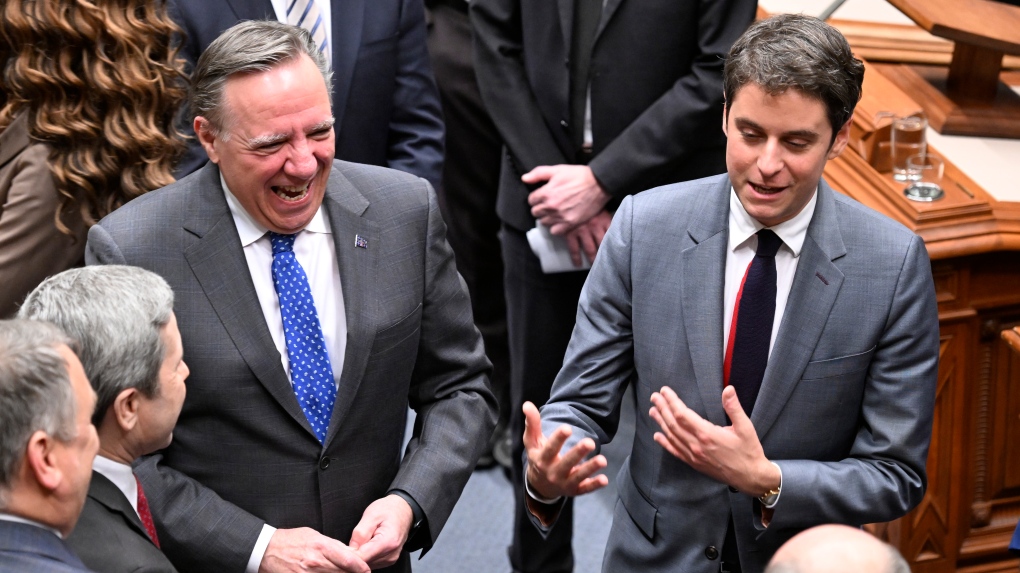French prime minister defends state secularism, denies interfering in Quebec politics
French Prime Minister Gabriel Attal used his visit to Quebec this week to express strong support for the province's model of state secularism even as he claimed to abstain from weighing in on debates over the controversial policy.
And despite his vocal backing of Quebec's secular values, Attal said he did not discuss the matter in meetings with Prime Minister Justin Trudeau in Ottawa this week, insisting his endorsement did not constitute meddling in Canadian politics.
"I believe that my responsibility when I'm abroad and when I speak to politicians, democratically elected, that have chosen this model, my responsibility is to tell them that they are not alone with this model," Attal said alongside Premier Francois Legault in Quebec City. "Is this interfering in political debates in Canada? I don't think so."
Quebec's secularism policy includes a 2019 law that bans many public sector employees including teachers and judges from wearing religious symbols at work -- legislation that critics say discriminates against religious minorities.
Secularism is also a foundational principle for France, where it is illegal to wear face-covering veils in the street. And in his previous post as French education minister, Attal banned long robes in classrooms citing their popularity among Muslim students.
"For us, secularism is above all a freedom," Attal said. "Secularism is what allows everyone to make their choices in good conscience, to be free to believe or not believe, and be free to decide (to) or decide not to practise a religion, to show their attachment and belonging to a religion. Secularism is what allows equality between citizens."
 The Prime Minister of France Gabriel Attal, right, chats with members of the legislature at the Salon Bleu of the National Assembly, at the legislature in Quebec City, Thursday, April 11, 2024. Quebec Premier Francois Legault, left, laughs. (Jacques Boissinot, The Canadian Press)
The Prime Minister of France Gabriel Attal, right, chats with members of the legislature at the Salon Bleu of the National Assembly, at the legislature in Quebec City, Thursday, April 11, 2024. Quebec Premier Francois Legault, left, laughs. (Jacques Boissinot, The Canadian Press)
Quebec's secularism law, known as Bill 21, has withstood multiple lawsuits, but its opponents hope to push their case to the Supreme Court of Canada. Earlier this week the English Montreal School Board said it would seek leave to appeal to the country's highest court a decision upholding the law. Meanwhile, the federal government has indicated it would participate in a challenge to the law at the Supreme Court.
Attal said Friday that he sees secularism as a way for governments to guarantee equal treatment of citizens regardless of personal beliefs, and that France shares Quebec's commitment to religious non-affiliation.
His validation of secularism differed from his noncommittal statement on the issue of Quebec independence.
Attal affirmed Thursday that he supports the long-standing French policy of "non-interference" and "non-indifference" toward Quebec sovereignty. On Friday, he expanded on those comments, saying he prefers to interpret the policy as one of "sensitivity and respect."
"We obviously have to respect Quebec in its capacity to conduct internal democratic and political debates," he said. "I don't want to make a declaration here that would give the impression that I'm taking part in a debate taking place here in Quebec political life."
The French prime minister was scheduled to travel to Montreal Friday afternoon to participate in panels on the economy before he ends his three-day trip to Canada.
This report by The Canadian Press was first published on April 12, 2024.
With files from The Associated Press.
CTVNews.ca Top Stories

2nd woman found dead in English Bay: Vancouver police
For the second time in as many days, a woman's body was found near Vancouver's shoreline Monday.
2 Albertans accused of threatening to kill Trudeau, Freeland, Singh
Men from Edmonton and Calgary are accused of threatening to kill some of Canada's top government leaders.
Athletes show off stylish and expensive team clothing for the 2024 Olympic Games
Canadian athletes attempting to reach the podium at the Paris 2024 Olympic Games will also be looking fashionable for the entire world to see.
Harris has support of enough Democratic delegates to become party's presidential nominee: AP survey
Vice-President Kamala Harris has secured the support of enough Democratic delegates to become her party's nominee against Republican Donald Trump, according to an Associated Press survey taken in the aftermath of President Joe Biden's decision to drop his bid for re-election.
Four suicides in New Zealand linked to Ontario's Kenneth Law
New Zealand's coroner has ruled that four of its citizens died after ordering products from an Ontario man who is facing murder charges for selling poisonous substances.
Toronto woman charged with voyeurism after taking 'intimate' photos during massage: police
A Toronto woman who allegedly took 'intimate' photos of an individual who was getting a massage has been charged with voyeurism, police say.
IN PICTURES Here's what Calgary's new event centre 'Scotia Place' will look like
The name of Calgary’s new event centre was unveiled on Monday. The arena will be called Scotia Place.
Harris steps into the limelight. And the coconut trees and memes have followed
If you're trying to get up to speed on Vice President Kamala Harris' swift emergence as Democrats' possible nominee this fall, you really need to know your memes.
These are the four leading vice-presidential picks for Kamala Harris' campaign
No one knows the importance of selecting the right running mate better than Vice President Kamala Harris.

































